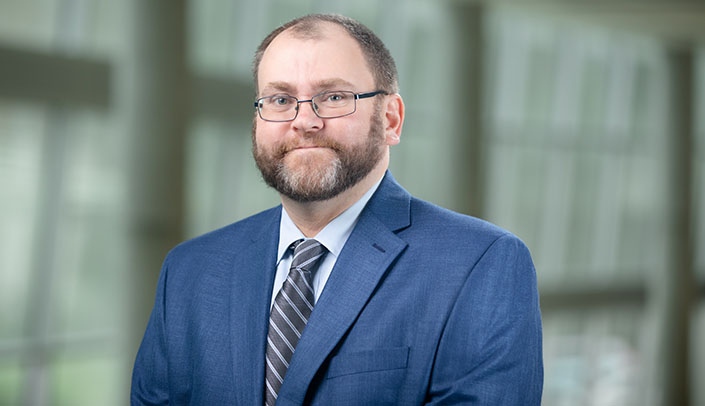Paul Trippier, Ph.D., is a new faculty member at UNMC.
- Name: Paul Trippier, D.Phil.
- Hometown: Manchester, United Kingdom
- Title and department at UNMC: Associate professor, pharmaceutical sciences
Research/professional interests:
- Small molecule drug discovery for cancer and neurodegenerative diseases;
- Chemical biology; and
- Organic chemistry.
How I fell in love with chemistry: During a high school science class, the teacher was explaining the reactivity of sodium. He put a small chunk of the metal into a bucket of water, intending to let us see it ignite in a controlled condition. It did ignite, but it then shot out of the bucket and burned a hole in one of my friend’s backpacks. After the fire department left, I was hooked. There is a thrill in being able to design and synthesize structures that have never existed before. Organic chemistry is the ultimate Lego set for adults. What fascinates me even more is how a molecule made by a marine sponge for example, or another natural product, can have activity to kill cancer cells or a virus. Nature is beautiful, and the medicinal chemist can harness that beauty, add in some flair and create small molecules that can be used to treat or better understand human disease. You have to admit that’s pretty cool!
Degrees:
- Master’s, chemistry, University of Hull, United Kingdom
- Ph.D., University of Oxford, United Kingdom
Memberships:
- American Chemical Society
- Royal Society of Chemistry
Two things people may not know about me:
- I’m a big Chicago Blackhawks fan and Wigan rugby fan.
- Almost everything in my house is pink; I have three young daughters and a wife, and even the dog is female.

Welcome to UNMC, Dr. Trippier. Your answer on how you fell in love with chemistry was awesome. I'm sure you'll be a great addition to our faculty.
In addition to creating useful structures that have never existed before you have a captivating way of communicating science! Looking forward to hearing more from your lab.